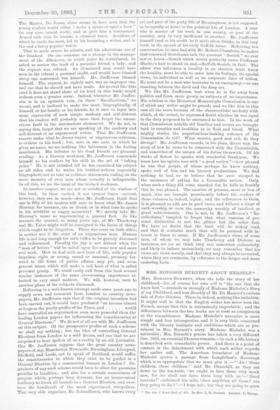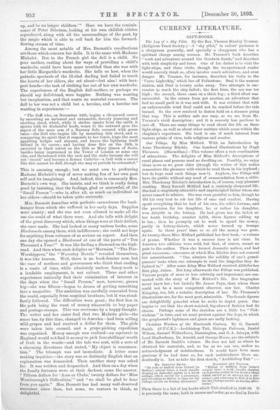MRS. HODGSON BURNETT ABOUT 1111RSELF.* MRS. HODGSON BURNETT, when she
tells the story of her childhood—for, of course, her own self is " the one that she knew best "—reminds us strongly of Madame Michelet's Story of my Childhood, and less directly of Mr. Da Maurier's curious tale of Peter Ibbetson. There is, indeed, nothing like imitation. It might well be that the English writer has never seen the French, except that this is intrinsically improbable ; and the differences between the two books are at least as conspicuous as the resemblances. Madame Michelet's narrative is more simple and less introspective, and it is very little concerned with the literary instincts and ambitions which are so pro- minent in Mrs. Burnett's story. Madame Michelet was a naturalist; Mrs. Burnett's genius has taken a very different line. Still, an essential likeness remains,—in each a life-history is described with remarkable power. And there is a point of contact in the detachment with which each writer regards her earlier self. The American translator of Madame Michelet quotes a passage from Longfellow's Kavanagh which is so appropriate that we must give it :—" Ah ! these ohildren, these children !' said Mr. Churchill, as they sat down to the tea-table, 'we ought to love them very much now, for we shall not have them long with us.'—' Good heavens!' exclaimed his wife, does anything ail them P are they going to die P I hope not ; but they are going to grow 4, The One I Know Boot of Alt. By Mrs. T. H. Burnett. London: P. Warne. up, and he no longer children." Here we have the reminis- cence of Peter Ibbetson, looking at his own childish eidolon reproduced, along with all the surroundings of the past, by the magic which is able to roll back for him the forward- flowing stream of time.
Among the most notable of Mrs. Burnett's recollections are those which concern her dolls. It is the same with Madame Michelet. But to the French girl the doll is a child. No poor mother, casting about for ways of providing a child's wardrobe, could have been more troubled than she was with her little Margarido's wardrobe. She tells us how, when the pathetic spectacle of the ill-clad darling had failed to touch the hearts of her elders, she set about—but alas ! with inex- pert bands—the task of clothing her out of her own wardrobe. The experiences of the English doll-mother, or perhaps we should say doll-friend, were happier. Nothing was wanting but imagination, and that wants no material resources. The doll to her was not a child but a heroine, and a heroine not wanting in experiences !— " The Dot who, on November 24th, begins a chequered career by mounting an untamed and untamable, fiercely prancing and snorting steed, which, while it strikes sparks from the earth it spurns with its disdainful hoofs, wears to the outward gaze the aspect of the mere arm of a Nursery Sofa covered with green baize—the Doll who begins life by mounting this steed, and so conquering its spirit that it responds to her touch, leaps the most appalling hedges and abysses, and leaves the lightning itself behind in its career ; and having done this on the 24th, is executed in black velvet on the 25th as Mary Queen of Scots, besides being imprisoned in the Tower of London as some one else, and threatened with the rack and the stake because she will not ' recant' and become a Roman Catholic—a Doll with a career like this cannot be dull, though she may at periods be exhausted."
This is amusing enough ; but we must own to preferring Madame Miohelet's way of never making fun of her own past self and its imaginings. And, indeed, this is commonly Mrs.
Burnett's own way. She insists, and we think is really doing good by insisting, that the feelings, glad or sorrowful, of the "Small Person "—who is, after all, as much an individual as her elders—should be taken quite seriously.
Mrs. Burnett describes with pathetic earnestness the book- hunger from which she suffered in her early days. Supplies were scanty ; and she was not even allowed to make all the use she could of what there were. And she tells with delight of the great discovery which, when things were at their dullest, she once made. She had looked at many various books, some Blackwoods among them, with indifference ; she could not hope for anything from volumes of so serious an aspect. And then one day she opened a Blackwood at one of the parts of " Ten Thousand a Year!" It was like finding a diamond on the high- road. And then when such delights as "Marmion," "The Fire- Worshippers," the " Waverley Novels" revealed themselves, it was like heaven. Well, there is no book-famine now, but the race of mothers and governesses who think that reading is a waste of time, while absolutely useless fancy-work is a laudable employment, is not extinct. These and other experiences naturally find their culmination of interest in the days when the " Small Person," now, however, grown big—she was fifteen—began to dream of getting something into a magazine. The ambition was carefully concealed from the world, especially from sceptical brothers; bat it was stead- fastly followed. The difficulties were great; the first lion in the path being the want of money wherewith to buy paper and postage-stamps. This was overcome by a happy thought. The writer and her sister find that two Mulatto girls—the scene has, by this time, changed to America—had been selling wild-grapes and had received a dollar for them. The girls were taken into council, and a grape-picking expedition was organised. Money enough was realised—an aspirants in England would not find it so easy to pick four-ehillings'-worth of fruit in the woods—and the tale was sent, with a note of a charming directness that stated, " My object is remunera- tion." The triumph was not immediate. A letter came making inquiries,—the story was so distinctly English that an explanation was demanded. Then another story was asked for. It was written and despatched. And then on a day when the family fortunes were at their darkest, came the answer. " Fifteen dollars for Aces or Clubs,' twenty dollars for ' Miss Westborough's Difficulties," and "we shall be glad to hear from you again." Mrs. Burnett has had many well-deserved successes since then, but none, we venture to think, so delightful.



































 Previous page
Previous page